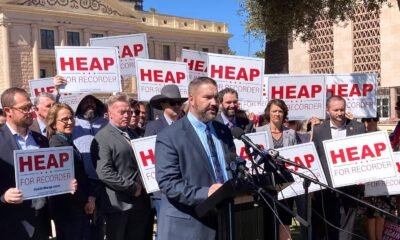Arizona Legislature
Sundareshan Takes the Helm of Arizona Senate Democrats

Arizona Senate Democrats have selected their leadership team for the upcoming 57th Legislature following a reduction in their caucus size. On Tuesday, the newly appointed leaders took their roles in preparation for the challenges ahead.
Priya Sundareshan (LD 18) has been named Senate Minority Leader. Flavio Bravo (LD 26) assumes the position of Minority Assistant Leader, while Rosanna Gabaldón (LD 21) steps in as Minority Whip. Lela Alston (LD 5) will serve as the Minority Caucus Chair.
In her first statement as Minority Leader, Sundareshan expressed gratitude for the trust placed in her by her colleagues. She acknowledged the difficulties they will face this legislative session, emphasizing their commitment to address pressing issues such as job accessibility, affordable housing, education quality, and long-term water security for Arizonans.
Sundareshan highlighted the importance of fostering bipartisan relationships, stating, “While Republicans have expanded their majority, it is paramount that we communicate and provide a better, bipartisan pathway forward.” She reinforced the focus on supporting working-class Arizonans and vulnerable populations.
Gabaldón took to social media to share her excitement about becoming Minority Whip, looking forward to collaborating with the leadership team and caucus. Her message reaffirmed her commitment to the party’s goals and unity.
These leaders represent a liberal faction within the Arizona Senate, with varying scores from the Arizona Free Enterprise Club: Gabaldón with 3%, Sundareshan at 4%, and Bravo holding a 7% score. This leadership marks a strategic position in a divided legislative landscape, where recent history shows Republican leaders have predominantly driven negotiations with Governor Katie Hobbs and her administration.
As the Arizona government navigates challenges in the next two years, legislative Democrats may find themselves sidelined in critical discussions, raising concerns about their influence in shaping policy direction.

















